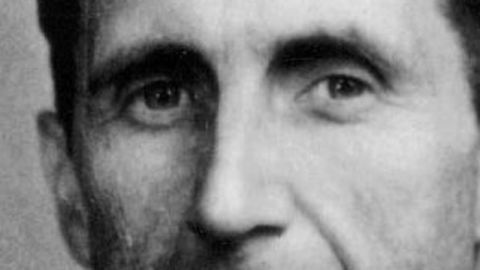Orwellian Phrase of the Week: “Orwellian”

Welcome back to The Proverbial Skeptic’s Orwellian Phrase of the Week. This week, it’s time to take aim at ourselves.
Anyone who has read The Proverbial Skeptic before will have noticed that Orwell is one of my great heroes (actually, my regard for Orwell is secondary and comes via Christopher Hitchens, my true intellectual hero, who had a lifelong love and passion for Orwell).
The vagueness, ease of use, and the buzz-iness of the word “Orwellian” certainly might mean that it fits its own definition.
There is a strong argument, which Jason Slotkin eloquently advanced in a recent post in The Atlantic, that the common use of the word “Orwellian” is itself the sort of thing that Orwell decried.
In defending his thesis that the use of the word “Orwellian” constitutes “taking Orwell’s name in vain”, Slotkin offers the following quote:
“Words of this kind are often used in a consciously dishonest way. That is, the person who uses them has his own private definition, but allows his hearer to think he means something quite different. Statements like Marshal Pétain was a true patriot, The Soviet press is the freest in the world, The Catholic Church is opposed to persecution, are almost always made with intent to deceive. Other words used in variable meanings, in most cases more or less dishonestly, are: class, totalitarian, science, progressive, reactionary, bourgeois, equality.”
I must admit that I do indeed sometimes lean on it as a catch-all condemnation.
So let me make my definition public: by “Orwellian” I do not mean “anything which I claim that Eric Blair would have actually condemned”.
I do not invest some mythical authority in the man himself.
I mean by Orwellian that my subject is reminiscent of the feeling of powerlessness, bondage, and outrage that one feels out of empathy for the inhabitants of the worlds of 1984 and Animal Farm.
I mean that what is wrong with whatever I call Orwellian is the same thing that was wrong with the societies described in Orwell’s novels. I emphatically do not mean that we are under threat of actually ending up in those worlds. I think that the capricious and unjustified exercise of coercion represents something which I would condemn if Orwell had never published a book.
When I call a phrase or a situation Orwellian, I mean it and intend it to be understood as a negative value judgment which we should not take simply on the power of the word itself.
So I will not stop saying “Orwellian”.
But, I will remain vigilant that I do not commit the genuine verbal crime which Slotkin describes, by using it in a way that “conforms to the phenomenon [Orwell] observed in his 1948 essay, Writers and the Leviathan, in that it’s a totally one-sided word, something people only ever use to refer to other people.”
To use Orwell’s legacy to twist words in order to gain power and influence is a heresy which everyone, including The Proverbial Skeptic, must be careful not to commit.





